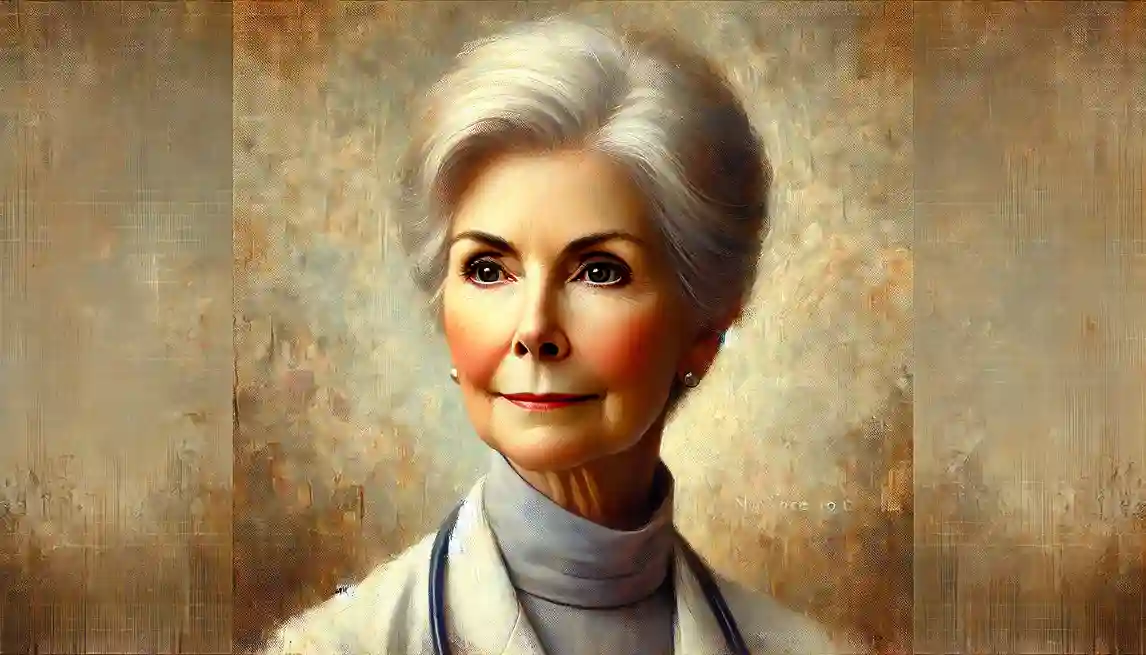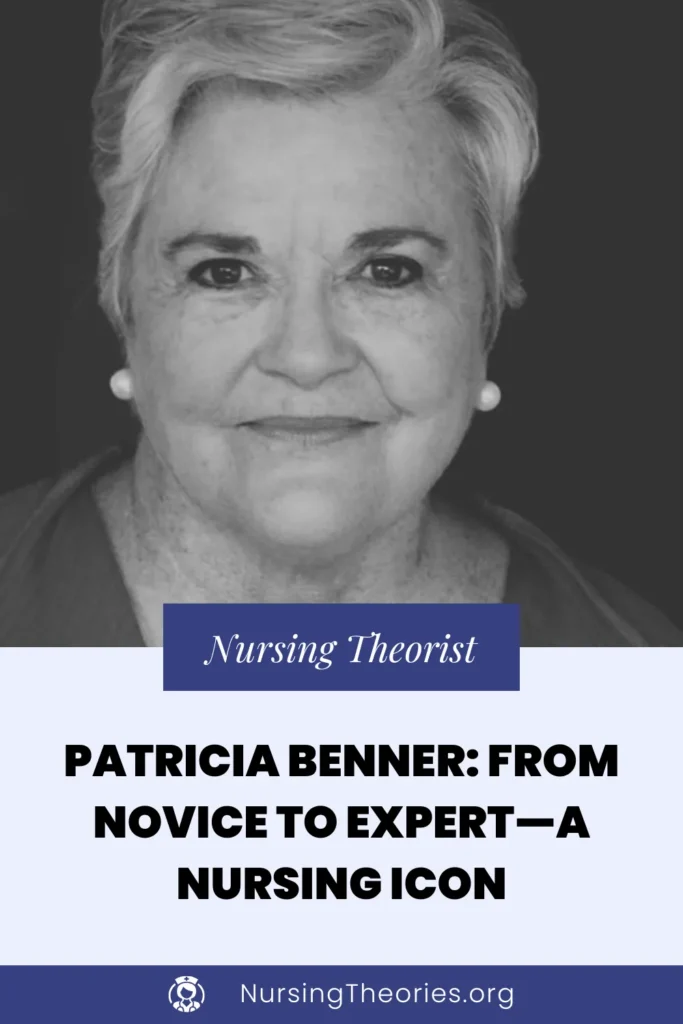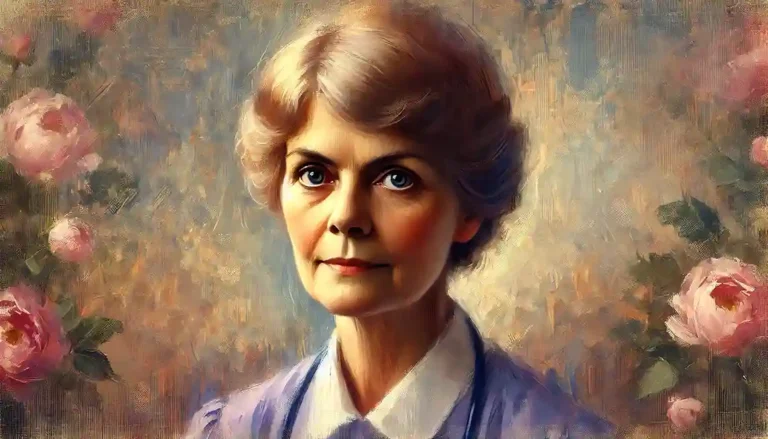Patricia Benner, a distinguished nurse theorist, educator, and author, is best known for developing the Novice to Expert Theory, a model that outlines the stages of clinical competence in nursing.
Her work focuses on how nurses acquire skills and knowledge through experience and practice, moving from beginner to expert levels over time.
Benner’s contributions have significantly impacted nursing education and professional development, shaping how nurses are trained and evaluated globally.
In this article, we cover Patricia Sawyer Benner’s life, achievements, philosophy, and lasting impact on modern nursing.

Quick Summary
- Developed the Novice to Expert Theory, which describes the stages of clinical competence.
- Emphasized experiential learning and the role of practice in skill development.
- Authored From Novice to Expert: Excellence and Power in Clinical Nursing Practice, a foundational nursing text.
- Advocated for bridging theory and practice in nursing education.
- Recognized globally for her contributions to nursing practice, education, and research.
Early Life and Background of Patricia Benner

Birth and Family Background of Patricia Benner
- Patricia Sawyer Benner was born in 1942 in Hampton, Virginia, into a family that valued education and service.
- Her early experiences fostered her curiosity and passion for learning, which would later influence her groundbreaking work in nursing.
Education and Early Influences in Benner’s Life
- Benner earned her bachelor’s degree in nursing from Pasadena College and later pursued a master’s degree in medical-surgical nursing from the University of California, San Francisco.
- She completed her Ph.D. in stress, coping, and health at the University of California, Berkeley.
- Her studies in clinical nursing practice and human experience served as a foundation for developing her theory.
Patricia Benner’s Philosophy and Vision for Nursing
- Benner believed that clinical knowledge is built through experiential learning and practical application rather than solely through formal education.
- Her vision emphasized the importance of context and experience in shaping nursing practice and decision-making.
- Famous quote: “Nursing is a practice discipline, and clinical knowledge is embedded in practice, not just theoretical learning.”
Patricia Benner’s Education and Early Nursing Career
Formal Education and Nursing Training of Patricia Benner
- Benner’s academic journey included a strong focus on medical-surgical nursing, stress management, and human responses to health and illness.
- Her interdisciplinary studies provided her with insights into the complexities of clinical decision-making and patient care.
Early Professional Experiences in Benner’s Career
- Benner began her career as a clinical nurse in acute care settings, gaining practical experience that would later inform her research.
- Her experiences highlighted the gap between theoretical knowledge and practical competence, inspiring her to explore how nurses develop expertise over time.
Key Achievements and Contributions of Patricia Benner
Development of the Novice to Expert Theory
- Benner’s Novice to Expert Theory describes five stages of nursing competence:
- Novice: Beginners who rely on rules and guidelines to perform tasks.
- Advanced Beginner: Nurses with limited experience who begin to recognize patterns.
- Competent: Nurses who have gained organizational and planning skills through practice.
- Proficient: Nurses who understand situations holistically and can anticipate outcomes.
- Expert: Nurses with extensive experience who intuitively grasp complex situations and provide effective care.
- The theory highlights the importance of mentorship and continuous learning in developing expertise.
Contributions to Nursing Education and Curriculum Development
- Benner’s theory has been integrated into nursing curricula to help educators design training programs that emphasize experiential learning.
- She advocated for clinical mentorship programs to guide novice nurses as they transition to higher levels of competence.
Research and Theoretical Advancements
- Benner’s research explored how clinical decision-making evolves with experience and how context influences nursing interventions.
- Her studies provided empirical evidence supporting the role of practice-based learning in professional growth.
Global Impact and Recognition
- Benner’s theory has been adopted internationally, influencing nursing practice and education worldwide.
- She has received numerous awards and honors for her contributions to nursing, including recognition as a leader in practice-based education.
Overview of Patricia Benner’s Novice to Expert Theory
- The theory emphasizes that expertise is acquired over time through practical experience and reflection.
- It highlights the importance of mentorship and context in shaping clinical competence.
- To explore this theory in greater depth, visit the in-depth article on the Novice to Expert Theory.
Notable Publications by Patricia Benner
- From Novice to Expert: Excellence and Power in Clinical Nursing Practice – A foundational text that outlines her theory and its applications in clinical settings.
- Expertise in Nursing Practice: Caring, Clinical Judgment, and Ethics – A book exploring how expertise develops in nursing practice.
- Numerous articles and research papers on clinical competence and experiential learning.
Challenges and Criticisms of Patricia Benner’s Work
Challenges in Implementing the Novice to Expert Model
- Some educators and administrators have faced challenges in fully integrating Benner’s model into traditional nursing curricula.
- Benner advocated for hands-on clinical experiences and mentorship programs to complement theoretical instruction.
Criticisms of the Theory’s Subjectivity
- Critics argue that the theory’s emphasis on subjective experience can make it difficult to standardize or measure progress.
- However, proponents highlight that clinical competence often involves intuitive and context-dependent decision-making.
Timeline of Major Milestones in Patricia Benner’s Life
- 1942: Born in Hampton, Virginia.
- 1964: Earned her bachelor’s degree in nursing.
- 1970s: Developed the Novice to Expert Theory based on her research.
- 1984: Published From Novice to Expert: Excellence and Power in Clinical Nursing Practice.
- 2000s: Continued to refine her theory and conduct research on clinical competence.
Legacy and Lasting Impact of Patricia Benner
Impact on Nursing Practice and Patient Care
- Benner’s theory has improved the way nurses are trained, promoting experiential learning and practical competence.
Global Influence and Recognitions
- Her work is taught in nursing schools worldwide and applied in healthcare settings.
- Benner’s contributions have earned her numerous awards and recognition as a leader in nursing education.
Final Years and Ongoing Contributions
- Benner continues to mentor students and collaborate with researchers, focusing on improving nursing education and professional development.
- Her ongoing work emphasizes the importance of bridging the gap between theory and practice.
Key Lessons from Patricia Benner for Modern Nursing
- Experiential learning: Hands-on practice is essential for developing clinical competence.
- Mentorship: Guidance from experienced nurses helps accelerate the learning process.
- Contextual decision-making: Effective care depends on understanding the specific needs of patients and situations.
- Continuous improvement: Nurses should engage in lifelong learning to enhance their skills.
- Bridging theory and practice: Benner’s emphasis on real-world application ensures that theoretical knowledge is useful in clinical settings.
Conclusion
Patricia Benner’s Novice to Expert Theory revolutionized how nurses acquire and develop clinical competence through experiential learning.
Her work, explored further in the in-depth article on the Novice to Expert Theory, continues to shape nursing education and professional development worldwide.
Benner’s legacy endures as her theory remains central to fostering effective, practice-based learning in nursing.


